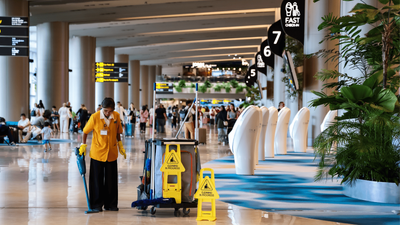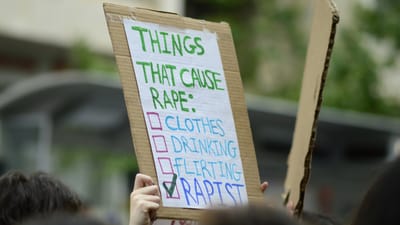The Labour Day Rally 2023, the first to be organised by advocacy group Workers Make Possible (WMP), was unique for a few reasons. It was not fronted by any political party but was a genuine ground-up, activist-driven event. It championed the rights of all workers, regardless of nationality (some previous events involved worrying xenophobia amid calls for job protection). It included concrete policy proposals, in the form of “The People’s 15 Demands for Labour Day”, which shed light on ongoing labour injustices. The celebrations involved riveting performances by pop, rock, rap and punk performers. In many ways, the event was a throwback to the energetic 1950s, and earned the rally mentions in The Economist and other international media.
The Jom team was also at Hong Lim Park last year, part of the 300 odd participants who braved both sun and rain to show their solidarity with workers. Amidst the fiery speeches and electrifying performances, Jom found some quiet time to hear the stories of several of the invited speakers: Staffan Stewart, a nurse, Suraendher Kumarr, a community worker and researcher for WMP, Swanhilda Kaur, an F&B worker, Peter Yeo, a food delivery rider, and Chua Qwong Meng, formerly a bus driver. Ahead of next week’s rally—see you there?—we’re republishing these vignettes that first appeared in our print edition last year. We’ve made small edits to account for the passage of time and other minor details.
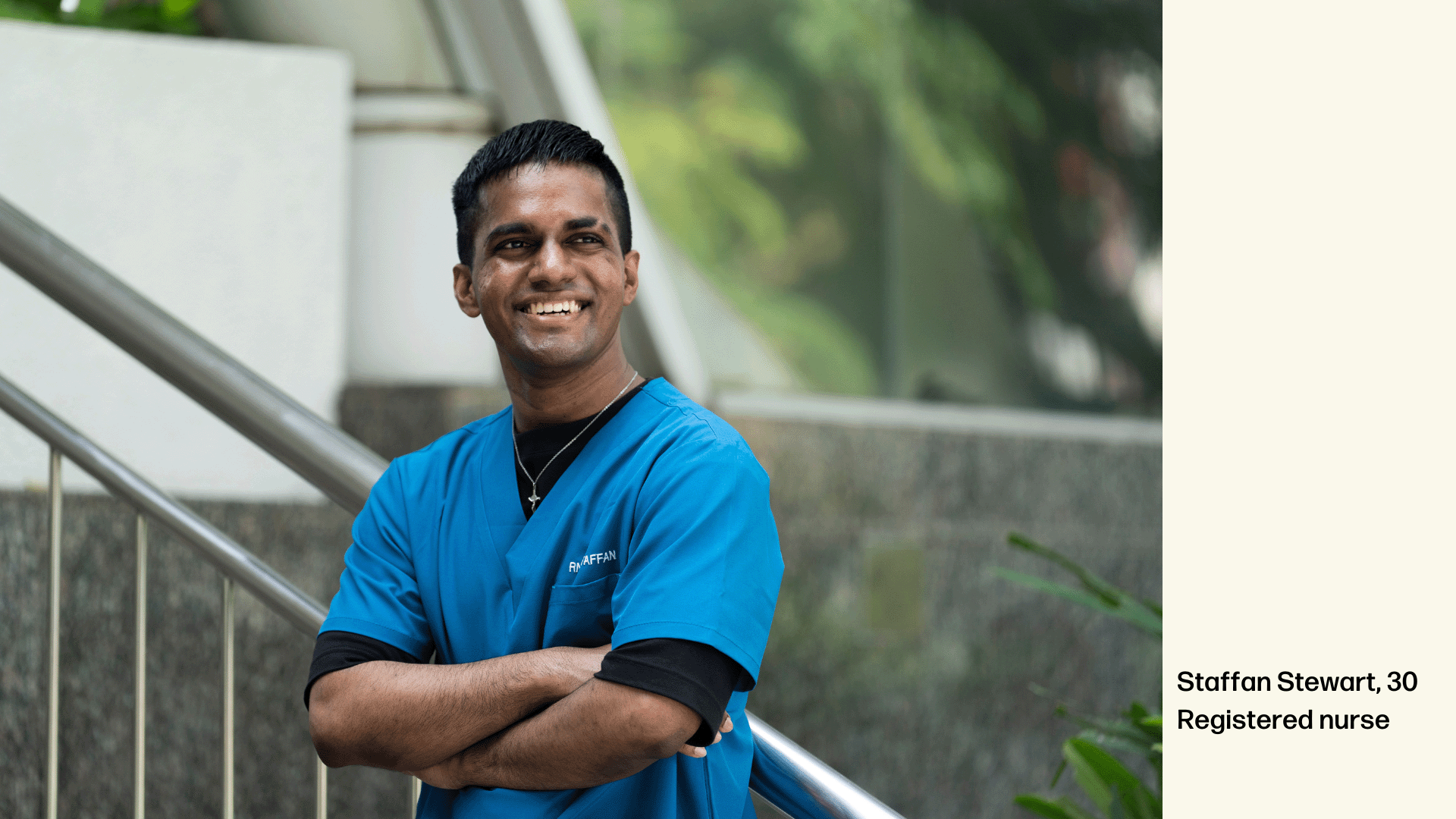
Staffan Stewart is a dedicated locum nurse who has been in the profession for 13 years. Since he started as a student nurse more than a decade ago, he has witnessed first-hand the challenges faced by healthcare workers: a lack of overtime (OT) pay, backbreaking amounts of work, abuse by patients, and consistent burnout. To draw attention to these issues, Staffan started his own podcast—“Room 7 Nurse”—in 2020, during the height of the pandemic. On Labour Day, Staffan donned a warm, friendly smile as he shared with Jom his account of the prevalent issues in the nursing industry and some of his own experiences as a registered nurse.
Jom: What labour exploitation do you see in nursing?
SS: There are many [issues]. Firstly, we are entitled to a one-hour lunch break. But in my entire career, I’ve never seen anyone going for that full one-hour break. If you are able to go for 15 minutes, you are already blessed. Another thing is our OT: we are not entitled to OT pay.* And they’re always short of staff. I mean, I’ve been hearing this since I was a student nurse. So it has been like 11 to 13 years, but the same excuse has been given.
*Editor’s note: According to the National Healthcare Group Staff Agreement 2022/23, eligibility for overtime compensation depends on the individual staff’s job grade. For example, healthcare staff belonging to the job grade “10 and below” are paid for overtime work in accordance with the Employment Act. However, as most nurses are at job grade 11 and above, they are not eligible for overtime compensation.
Jom: What can be done? What can nurses do to alleviate the situation?
SS: If the manpower issue is going to be there for a long time, the least the managers can do is to make the culture more peaceful, lovable and enjoyable. Once you can change the culture, people will come to work because of the culture. Although it might be a crazy shift, if I know you’re on shift with me, I’ll be like: “Eh, you’re working with me. Yes! I can come to work! And I know we are all in this crap together.” So yup, I think if they can change the culture, that will have a big impact on nursing and the nurses.
Jom: What is the worst experience you’ve had with a colleague or one of your patients while working as a nurse?
SS: I think the worst experience is staff abuse, because when you’re already tied down and you have so many things to do, and you get patients who are abusive, you can’t do anything. Let’s say, my patient slaps me or scolds me, I feel like: “I’m doing so much for you, but you’re just scolding me and all this. I don’t feel valued.”
We do get it [physically abused]. Verbal abuse [too]. Throwing things not yet, except the hands, yeah. They throw [wave] the hands.
Jom: Is there anything that makes it worthwhile? Has anyone done anything nice for you that made you feel appreciated?
SS: You do have patients who will thank you for doing the smallest things. So maybe I help them to clean up or feed them. These simple things where they say “thank you”—it makes your day and keeps you going. Because when you look at the crazy shift, you feel like you have so many things to do, but no one cares about you. But when, let’s say, I feed you Milo or something and you’re finally like: “Eh, thank you so much for today”. I’m like: “Wow, that actually means a lot.” So it’s the simple words patients use [that] actually brighten our day.
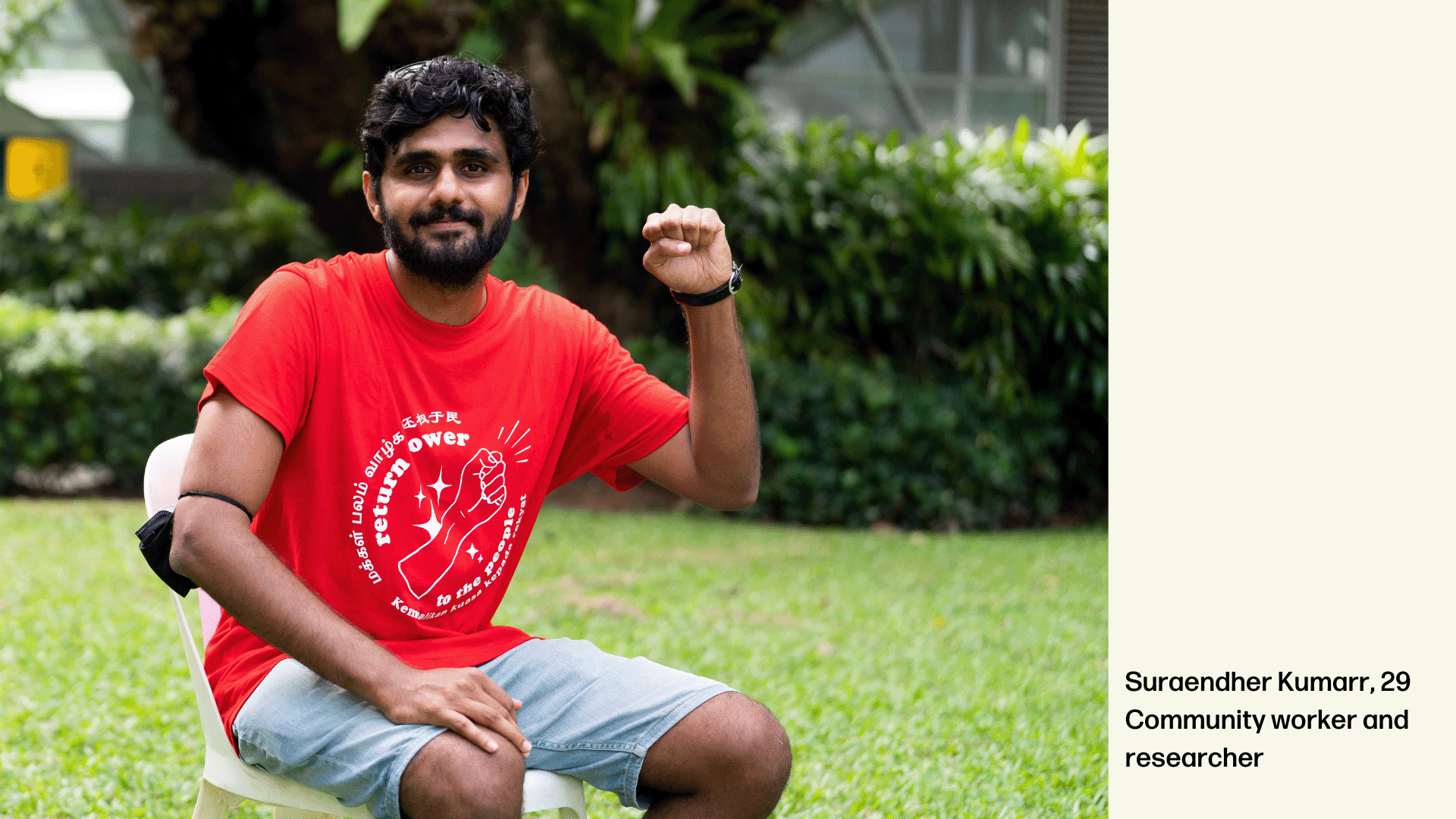
Suraendher Kumarr is a community worker and researcher for WMP, the group that organised 2023’s Labour Day Rally. The advocacy group first came together in late 2021 to raise funds for ex-SBS bus drivers involved in the 2021 lawsuit against the bus company, and has since diversified into advocating for all workers in Singapore. Kumarr got involved with WMP about a year ago and has been advocating fiercely against labour exploitation in different industries. Like many workers in Singapore, Kumarr believes that there are loopholes in existing safeguards for workers and calls for solidarity between workers in Singapore. Speaking to Jom, his astute mind was evident in the precision of his words, but he also exuded a certain gentleness and humility that, unsurprisingly, has rallied so many others to his mission.
Jom: In the general scope of workers in Singapore, what do you think is the main labour exploitation issue?
SK: I think it’s the fact that there are very few safeguards from excessive profiteering of workers’ labour. What we don’t have is sufficient safety nets to protect the workers’ rice bowls. And to protect their welfare if, let’s say Covid strikes or another crisis strikes. Tharman Shanmugaratnam [then deputy prime minister, now president] believes in this idea of a trampoline that we don’t have…I think for a lot of people, the trampoline, the spring is not working and a lot of them are falling through the trampoline itself. It’s not even about bouncing back. People are actually falling.
Jom: There have been measures in Parliament that have been suggested by, as you mentioned, Tharman. What is the general strategy that we should have to circumvent this kind of problem?
SK: I think what you will hear today in this Labour Day event is the constant cry that workers need to work together. Before we can even talk about workers in F&B, workers in food delivery, and all that, to come together, let’s focus on workers in a particular company to come together. Workers are not united because there are so many things that are put in place to divide workers, right? Whether it’s through nationality, whether it is through race, whether it’s through gender, and whether it’s through like a higher-performing worker or a lower-performing worker, this workplace culture needs to be solved first. I think what we can do is to resist these urges, and try to always identify, what do we share in common?
Jom: How can workers overcome this fear of being censored or being punished for speaking up?
SK: What our bosses—the ruling elite—like to say is: compete or die, right? What I like to say is that we need to collaborate and we need to have solidarity. It’s easier said than done. We’re distracted by racism, we’re distracted by whether you’re a Singaporean or migrant, migrant workers stealing our jobs, and all that. I think these are all lies. It’s the fact that very, very greedy, ultra-rich employers are taking advantage of workers and trying to create an artificial divide…So I think a very small step that workers can do is create a positive work culture. Get to know your co-workers. When a co-worker seems to piss you off, find out what’s really going on. I’m not saying that all workers are saints. But I’m saying that we have common interests. And I think the tough part is finding out what the common interests are.
Jom: In terms of community, what can the rest of us do to support workers?
SK: If, for example, you’re a member of society, and if you’re a worker yourself, you should try to talk to your co-workers and try to bring them together. Reach out to us if you need any help. And if you’re not and you don’t have those opportunities, reach out to us and volunteer. That’s a good way to try to do something and there are a few worker groups around.
Jom: You’ve volunteered and you’ve seen how demoralising things can be. What is the worst experience that you’ve seen so far?
SK: Wow, I will say that the worst experience is the death penalty. The death penalty is, to me, basically criminalising poverty. A lot of people who are on death row are very low income. And they are, I think, minorities—most of them. I don’t see them [the government] going after the drug lords. I don’t see them going after the wealthy people who are partying with drugs and so on. Instead, they’re going for the drug mules. And these guys are workers as well—they are drug couriers, but they’re illegal workers.
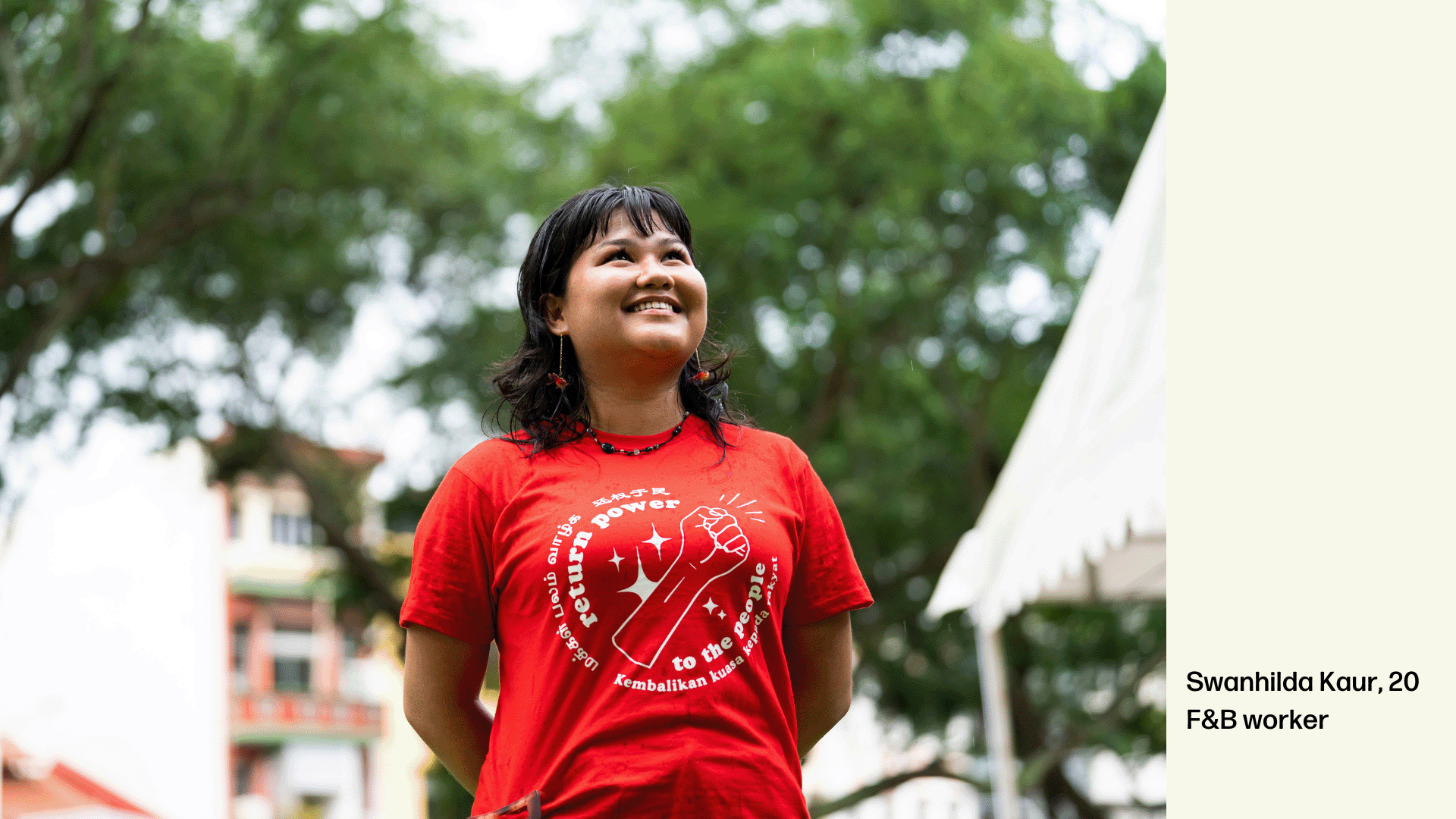
Swanhilda Kaur has worked in the F&B industry since she was 14, juggling her secondary school studies with earning her own income. The excitement of starting her first job soon soured. She experienced workplace toxicity, burnout, and harsh treatment by cruel superiors at a tender age. Despite this, she found solace in the solidarity she shared with her co-workers, all toiling to make ends meet. Swan brimmed with passion as she recounted the ill-treatment she faced as a worker in a pizza joint, a barista and a bartender, but lit up when she recalled the heartfelt moments and laughs she shared with co-workers.
Jom: You’ve been in the F&B industry for about six years? How has it been?
Swan: Very, very shit. Yeah, I mean, at first it was obviously very fun lah. You know you’re 14 years old, just your first job. It’s quite fun. But after some time…the burnout really started to kick in, because I was starting to pay for more and more of my own expenses. And that means that I had to work more. So I had to work on my weekends, during my holidays, and it got quite difficult because of how toxic the environment is in the F&B industry...
I remember it was Christmas and I asked my manager, “I really need to pee. You know, I haven’t gone to the toilet for the past five hours. So can I go pee?” And he screamed at me and said, “What do you mean, go pee? It’s Christmas, you know, it’s peak hour! Can you not see we are in the middle of dinner?” And I cried at the back. And, you know, this is very standard in the F&B industry lah, in the sense where you’re not expected to go anywhere, when it’s peak hour, right? I couldn’t stand looking at the migrant workers being just screamed at, you know? The dishwashers with their peeling hands, and just the exhaustion that everyone had on their faces. And I guess that’s what pushed me to join Workers Make Possible. Sometimes people ask, like, “Oh, you know, if you do this [advocacy] work, won’t you get burnt out?” But the fact is I’m already burnt out. And I see this work as the only shot for my liberation.
Jom: What is the worst thing that you’ve heard either from your experiences, or from your friends while working in F&B?
Swan: There was a dishwasher at this one place I worked at. These dishwashers were from China. And so one day I just happened to ask—we all called him “da ge”, which means “big brother”.
Da ge, so when is your off-day?
He said, Well, I don’t have an off-day.
What do you mean—don’t have an off-day?”
I work seven days a week.
But you just worked a 14, 15-hour shift? Yeah.
And it just continued like, How long have you been working here?
Six, seven years.
Can you imagine that? It’s insane, right? Every day. So cruel because of their skin, you know? Can you imagine spending 14 to 15 hours every day exposed to these chemicals?…And the thing is, these workers are paid so low that they don’t want to report to the authorities because then they will have to work less, they have less money to send back to their families...And also why would they wanna complain when they need that money? They’re paid so low that they need that money.
Jom: What has somebody done to make you feel special? Has someone gone out of their way to make you feel nice?
Swan: I think [it’s] the solidarity between workers, be it customers who are workers themselves or workers who are at your workplace. For example, at that shitty workplace where the dishwashers were not even afforded gloves, there was a lot of care that we showed each other as workers. If you see anybody exhausted, [you say]: “I cover for you—10 minutes.” “Do you need water, do you need a drink?” That is how we help each other survive lah. It just took one person to cultivate that culture, you know? Just that one head barista. And he’s not even a manager or anything. He taught me a lot about what solidarity can look like.
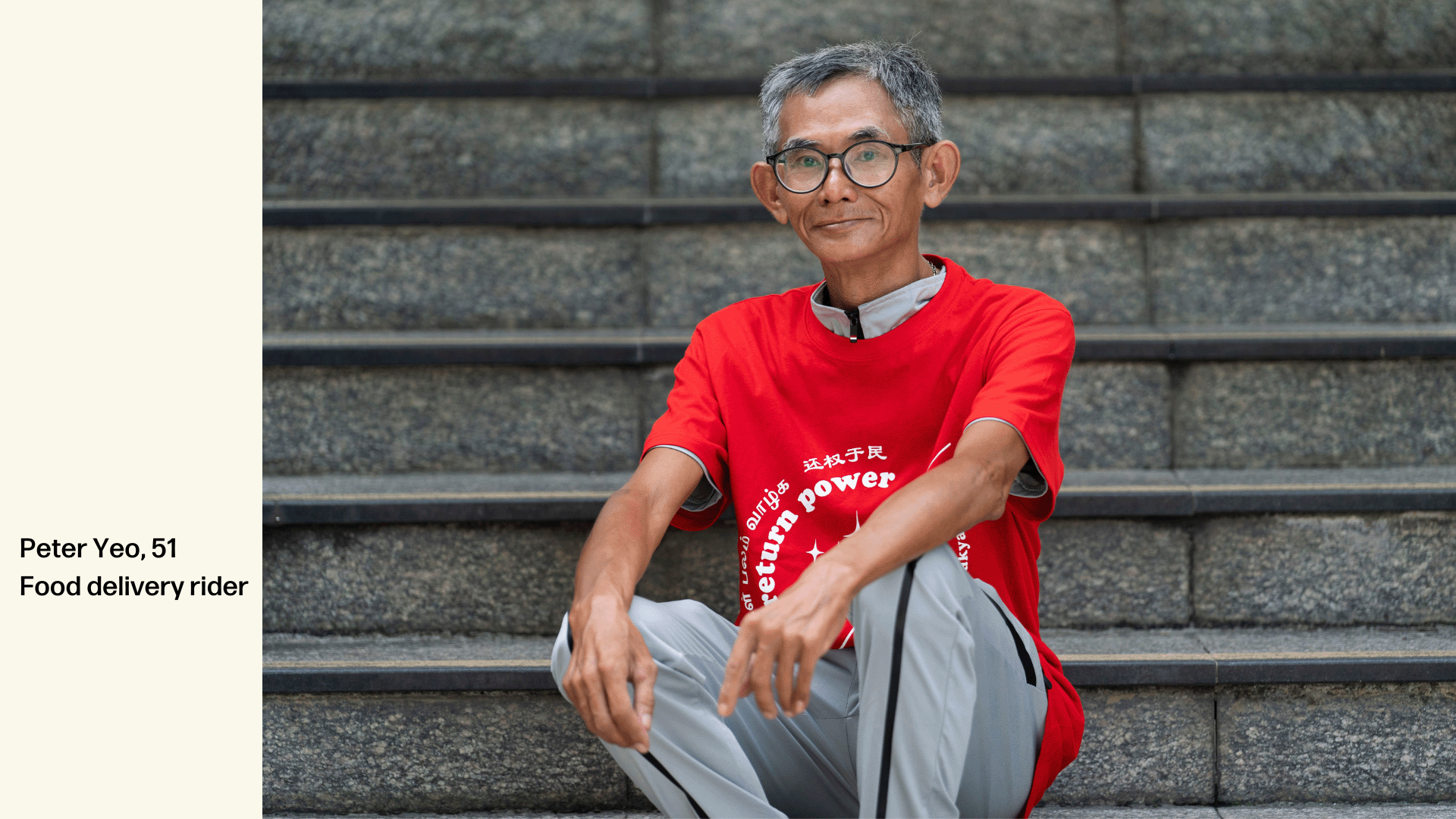
Despite his age, Uncle Peter (as he is usually called) rides his trusty electric bicycle, braving both unrelenting storms and the scorching heat in Singapore to deliver food. Uncle Peter has worked with every major food delivery service in the country. He thinks it’s important to treat every rider equally, whether they work for Grab, Deliveroo, or foodpanda. “We’re all riders,” he said. In addition to his backbreaking work, he also cares for his two brothers at home. Both suffer from chronic illnesses, while Uncle Peter himself currently nurses a spinal cord injury, sustained while off duty in September 2022. Unlike Deliveroo and foodpanda, which offer only on-duty insurance, Grab also offers “Prolonged Medical Leave” insurance to protect riders’ earnings in such off-duty circumstances. But it’s only available to its middle and upper tiers of riders. Uncle Peter, in a cruel twist of fate, had dropped to Grab’s bottom tier just the month before, because he had not completed a sufficient number of rides on its platform. (In early 2023, Grab revamped its partnership programme to refresh tiers quarterly, rather than monthly, to offer more leeway for temporary drops in rides completed.) Though Singapore is making strides to improve worker representation, insurance coverage, and Central Provident Fund (CPF) contributions for delivery riders (and gig workers more broadly), there’s a long way to go. After a few cigarettes and a couple of laughs with the team, Uncle Peter opened up to Jom about his personal life while bemoaning the dismal state of food delivery services, and the vulnerable state of riders in Singapore.
Jom: What kind of issues do you want to bring up today?
UP: In terms of the minimum fare guarantee, the fares are getting lower day-by-day. They should have a [new] system. (WMP has called for a S$6 per trip minimum fare guarantee for delivery riders.)
Jom: All riders, like yourself, are experiencing this kind of crunch. What are some ways that riders have been coping?
UP: Initially, I was trying to talk riders into going offline because we riders are classified self-employed. [“Going offline”, a form of collective action, refers to logging off the platform to restrict rider availability.] We are not considered “employees” and certain platforms term us “rider-partner”. Certain platforms, when we sign a contract with them, we are their subcontractor. So we are not protected by the MOM [Ministry of Manpower] law in certain grey areas.
Jom: What is your medical issue?
UP: I was suffering from an injury of my spinal cord; it affects my motor skills and sometimes my whole body will go numb, without any notice. Right now you see me standing straight—sometimes ah I may be off-balance.
Jom: And can you also talk about the care you have to give at home to two people?
UP: My brother was a Stage 3 lung cancer patient. After that it developed into a cancer that is spreading all over his body. For the last month, he has been admitted to hospital four times. Every week he was admitted. And this last week when he was admitted, he was isolated. And the doctor asked him, just in case he’s in critical condition, “Would he like to be resuscitated by them?” He said “no”, he wants to go naturally. And one of my elder brothers is suffering from dementia. And it’s very stressful for me to take care of him lah.
Jom: What is something very nice that a customer did for you, or an act of kindness from maybe a colleague or a fellow rider?
UP: I actually put on Stomp. There was very heavy rain. I was travelling around Robertson Quay. And it was actually the jogger’s fault because while I was travelling, he ran in my direction. I got no choice; to avoid injuring him I applied my brakes and I skidded. I was injured quite seriously. After that, I finally reached the customer’s place. I explained to the customer that I was involved in an accident, and she only ordered a piece of cake. And, at that point of time, I told her, “Would you like to open up the cake to see if it’s still intact? I can pay you for the cake.” She said, “Don’t need!” At the end, I saw on my app, she gave me, I think, a S$20 tip for that. And one of the condo guys let me rest for a while. And she also offered me an umbrella so I can look for my spectacles. My degree is very high. Without my specs right, I can be considered half-blind.
Jom: Do you think that you’ll continue in this line of work as you are growing older?
UP: I think maybe after four years ah, I think I cannot make it anymore. Because it’s very taxing when you’re riding an electric bicycle, when you go up the slope, especially at Mount Sophia. When you go to [certain condominiums], I don’t know why the condo management doesn’t allow [us to go in]. We have to park our bicycle. Imagine, when you’re sending [a delivery] to the last block, it’ll take you 20 minutes to walk down from the guardhouse to the carpark just to deliver the food. Inside the carpark, there are no signs. You may lose your way, and you may end up at a second entrance. You need to make a long way to go and retrieve your bicycle. I think they [the condominium management] should do something better. They should allow riders to ride in.
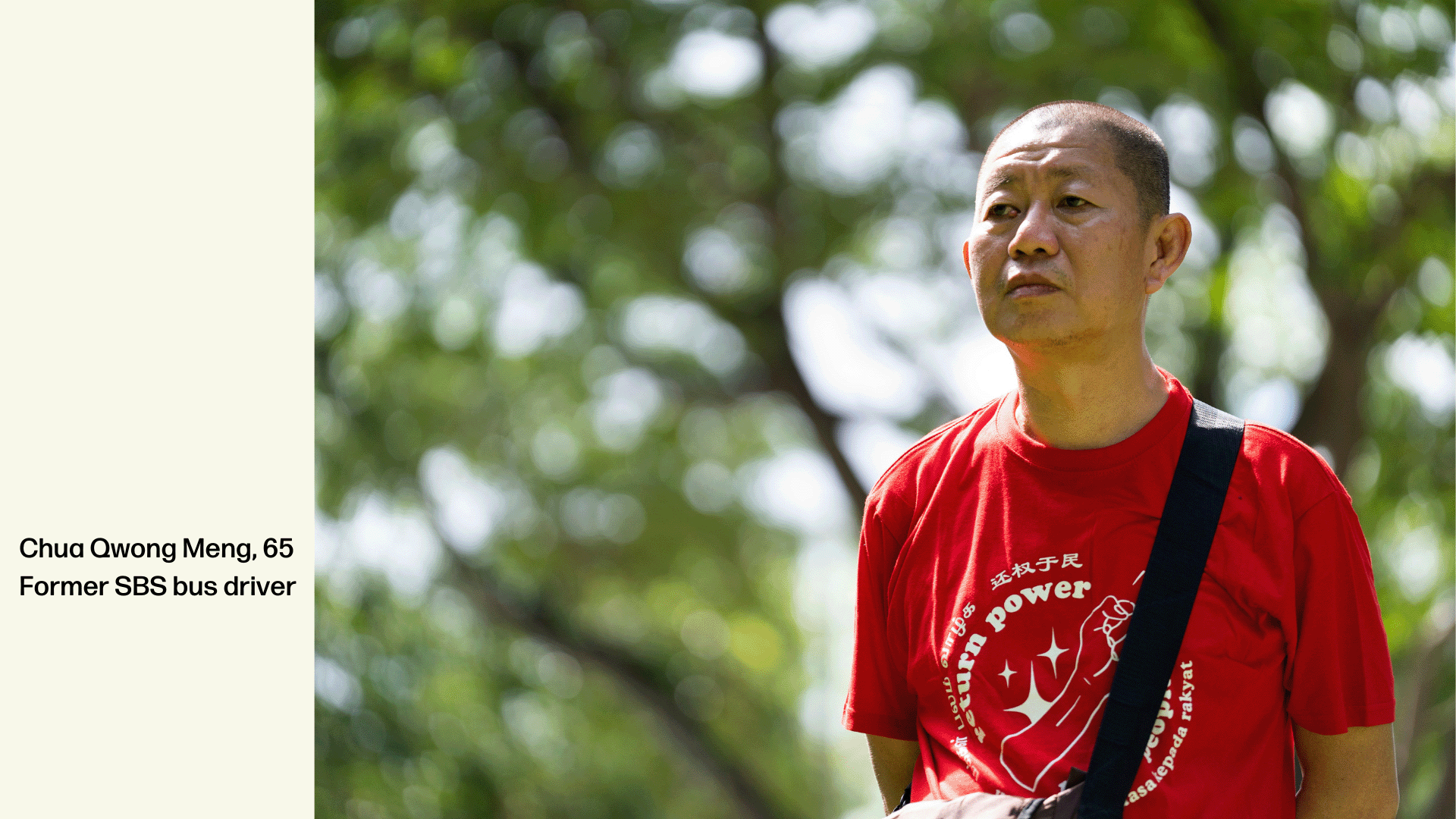
Chua Qwong Meng racked up around half a decade’s worth of experience as a bus driver with the Singapore Bus Service (SBS) before the company terminated him. Throughout his tenure, he saw his fellow drivers, many of whom were migrant workers, corralled into a life of low wages, long hours, and bullying. Fed up, Chua, along with 12 of his fellow drivers, sued SBS Transit for unfair work practices in 2019. Chua believes strongly in the power of unions and solidarity between workers. He jokingly described himself as “kaypoh”—unable to stay quiet if he sees a person treated unfairly.
Jom: How do you feel attending today’s rally?
CQM [in Mandarin]: Very happy. This is my first time participating in such an event, especially one related to workers’ rights. I’m very happy. I feel very honoured to be able to participate. Very happy.
Jom: Why are you here? What support do you want to show?
CQM: I am gathered here today with other workers to share some of the difficulties we face at work. [We] shouldn’t carry the burden [of these problems] alone. If you face tough difficulties at work, you shouldn’t carry the burden of it alone. Seek help. For example, MOM, unions…seek help. If you’re unable to find a solution, let’s brainstorm ideas together.
Jom: In your industry, what kind of labour exploitation do you see?
CQM: The most important problem I see is [workers being] treated unfairly. In terms of salary, it’s unfair. I’ve worked as a security guard, a cleaner, bus driver, so I know salaries are not equal or fair. For example, when I first joined SBS [as a Singaporean], my salary was S$1,650. For Malaysians who first join SBS, their salary is S$1,350. This is a large disparity. I ask you, if you were the boss, who would you employ?
I would employ whoever is cheaper. I want to discuss this with the relevant authorities—have a serious discussion about [salary] disparity. I think we need to increase salaries until they are equal. As long as you are working in this [bus] industry, salaries should be S$1,650. Regardless of whether you’re a foreigner or local. Correct? This would be fair to both Singaporeans and foreigners. A foreigner comes to work in Singapore, he’s doing it for his family. By doing so, he contributes to our country economically. Singaporeans work for our nation, for our economy, for our family. We have the same goal. That’s why I believe we need to be equal. That’s the most important thing.
Jom: What have you done so far to help tackle these problems?
CQM: I’ve helped out a lot. Singaporean workers, workers from China, Malaysian workers. I’ve helped them all. If they contact me, then I’ll help. I don’t seek them out.
Just help them with the different issues they’re facing: being cheated by bosses when signing contracts that say if you stop working you need to pay three or six months’ worth of salary, things like that…they’re all unreasonable. They all flout the law. You’re oppressing workers. So I will help them fight [for better terms]. I’ll speak to the HR department, then speak to them again…eh, how can like that? I’ll do that. I’m not aggressive, I’ll just try to help them like that.
Jom: Are you afraid that the government will come after you? Is there fear?
CQM: For others, I think they fear. For me, I don’t care lah. I’m almost 65, anytime I can die. So you want, you come lah. I don’t worry one lah. I’m prepared lah. I’m not a politician, firstly. I’m only working class. I’m a citizen of Singapore. I believe I have the right to speak up about what I see. Correct or not? You see, like, people support opposition. People support our government party. You have a right to. Correct or not?
Jom: Besides making a complaint, what other avenues can other workers use to get support?
CQM: I believe the important thing is the union lah. Union is very important. Union must be totally independent. Transparent. And balanced…Correct or not? So everything he does, he must follow the law. The law is there. You follow the law, will never go wrong one.
This essay was initially published in Jom’s first annual print magazine, which you can purchase here.
In 2024, the Labour Day Rally will take place on May 1st at Hong Lim Park starting 3pm. Get updates from Workers Make Possible.
Letters in response to this piece can be sent to sudhir@jom.media. All will be considered for publication on our “Letters to the editor” page.


